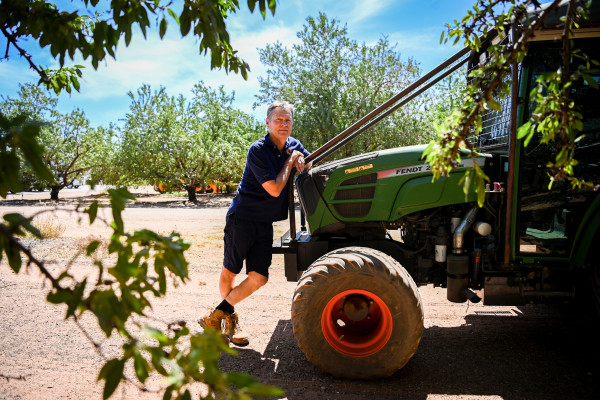MERBEIN almond grower Neale Bennett reckons he is ahead of schedule in this year’s harvest.
And he’s not just talking about the two, 21-acre blocks he runs with wife Debbie.
Because, in his spare time, he and a mate are also harvest contractors and still have another 970-plus hectares to get through.
But, season notwithstanding, in the perfect world it will still all be a wrap by Easter.
It’s a pretty impressive workload by anyone’s imagination, but Bennett is the first to admit he is something of an impulse farm manager and that tends to make life a little difficult from time to time.
First it was 1992 and he was facing yet another series of challenges in the dried fruits industry, in which he and his family had been engaged since circa 1910.
So pulling right out of the family history to do what he believed would be the best decision for his and his family’s future, generated a fair bit of comment – and amusement – among neighbours and peers at the time.
“At times it was a bit like being in that old TV show Greenacres, where the city executive moves to the country and buys a farm and bumbles along from season to season,” he laughs.
“This had been grape country for a long time but things were getting challenging, and things were happening which pushed us towards change.
“The dried fruit market was deregulated — labour costs were soaring and plenty of our plantings had passed their use-by date.
“We could see the emergence of almonds as an opportunity, you could machine harvest, there was a lot of investment coming into the industry, it seemed a good decision to make.”
A decision which today sees almost 4000 trees across the Bennett family’s two blocks, and in a normal year that would deliver somewhere between 42 and 45 tonnes.
Last year it was barely 36 tonnes and almonds were an industry in pain.
Which is why Neale also believes Select Harvests copped a bit of harsh publicity, with its $115 million loss being plastered all over the media and wider world.
He says it wasn’t just almonds, right across horticulture it had been a very tough year.
“It was a year which had been way too wet, and too cold,” Bennett said.
“Like most irrigators, we do our fertigation through the drippers and they weren’t running anywhere near normal levels because of all the rain so we were already underdone for nutrients,” he said.
“Then all that cooler weather hardly helped the nutrients that were delivered synthesise, so we ended up with a lot of flatter almonds.
“Even worse, the varroa mite incursion stopped movement of hives across the Victoria/NSW border and that further reduced productivity so all of us, from Select Harvests to small production units such as ours, were hit hard by those conditions.
“But now we are half way through this harvest and things look a lot better, it’s not wet, yields seem OK and there are fewer problems, so it’s a matter of putting that bad harvest in the rearview mirror and focusing on rebuilding.”
Bennett said the previous harvest has also made sure everyone is going as fast as they can to get this one off the trees while weather conditions remain good.
The production target is to deliver processors – in his case Almondco in South Australia’s Riverland – a crop with a 5 per cent moisture level in the kernel.
That is the optimum level as the moisture impacts the quality of the final product and the 5 per cent gives you “the crunch” in your almond.
Bennett’s kernels are air-dried with the process starting with shakers at the trees, windrowing and then the conditioner is used to constantly turn over the kernels, clean out the twigs and leaves and prepare the crop for processing.
“We grow mostly Nonpareil, using Price and Carmel as our pollinators – but we have put in a trial patch of Shasta, a new self-fertile variety from California.
“It went in last year and we should start seeing some results in the next two or three years.”
The pollinators are also used for value-adding in products such as the slivered, flake or almond meal market.
All good results that might help protect his business from the ongoing varroa management challenges and then everything will be fine – until the next problem emerges.
And it will, Bennett concedes; or it just wouldn’t be farming.
















